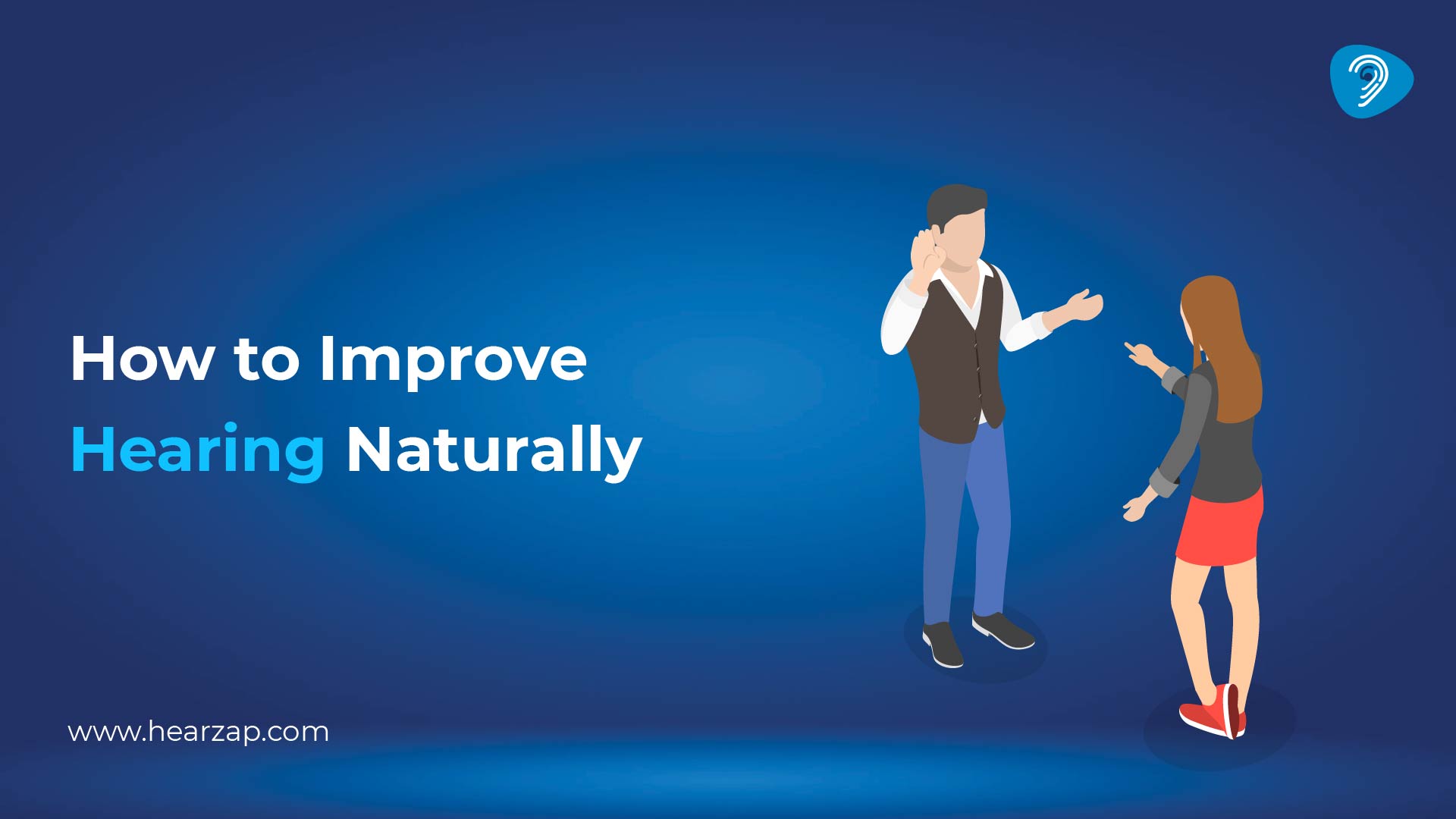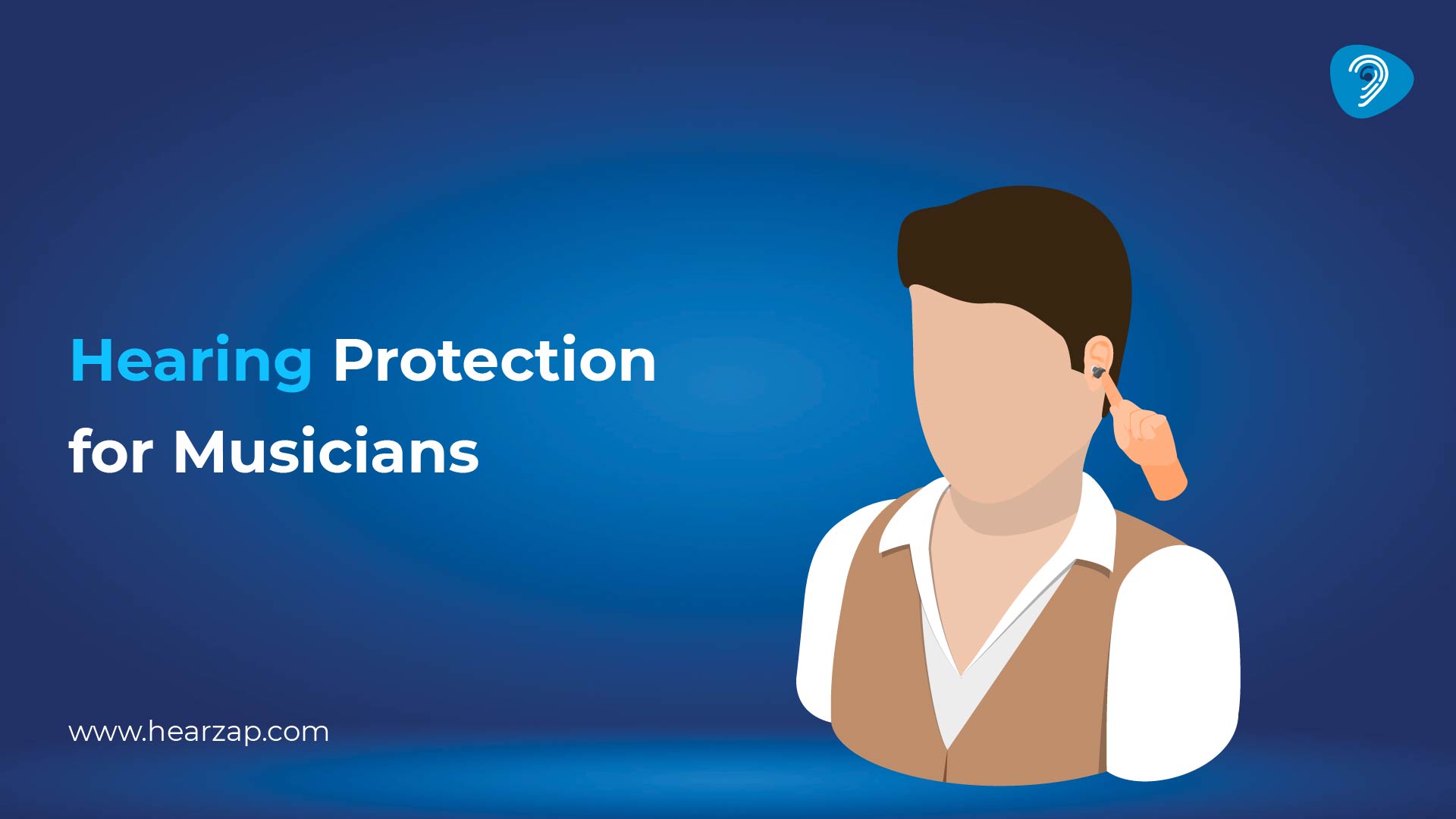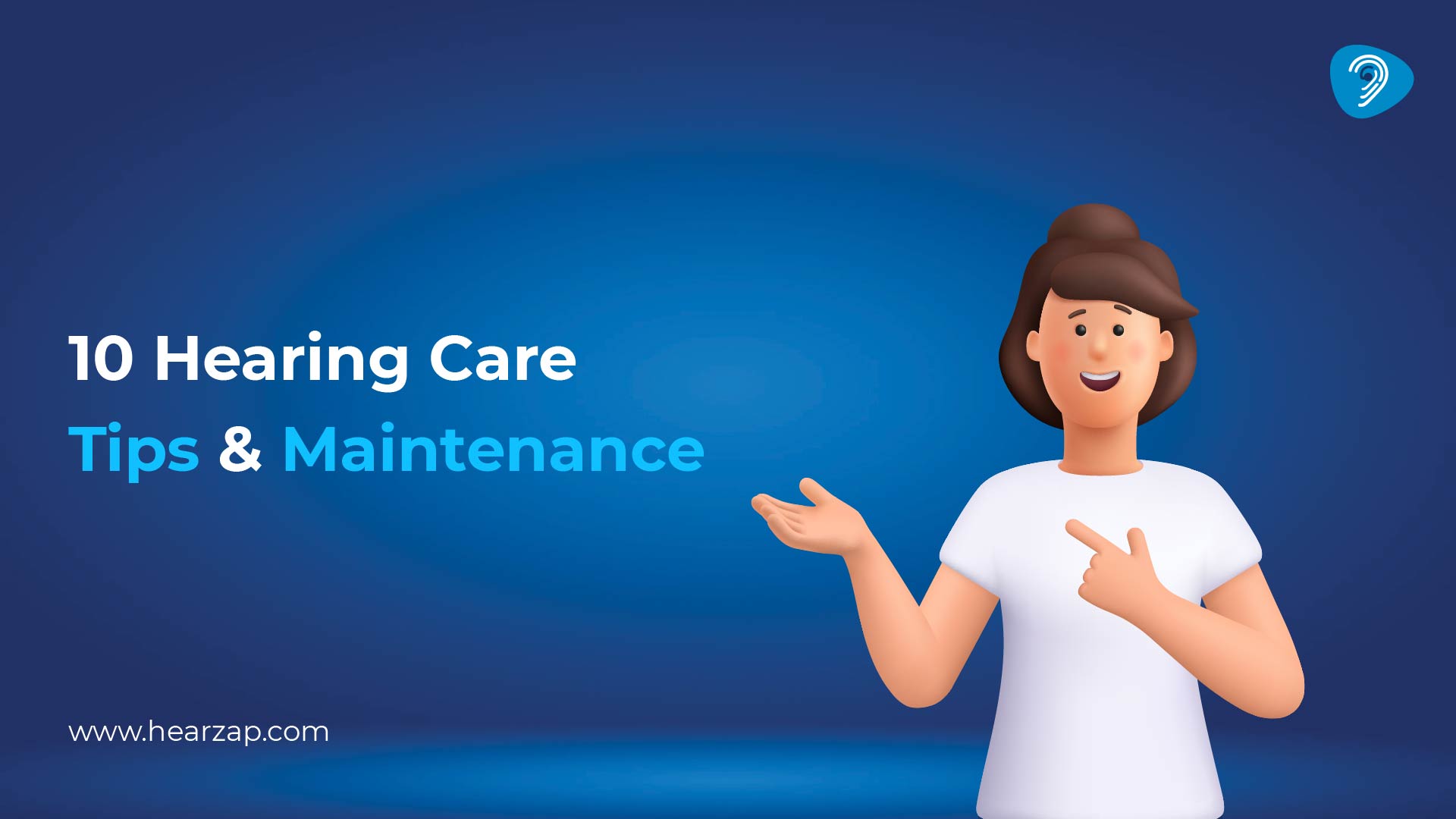HEARING CARE
10 Ways to Improve Your Hearing Naturally
By Team Hearzap | Oct. 4, 2025

Healthy hearing supports conversations, work, and safety in daily life. If you’ve noticed you’re turning the TV louder, missing doorbells, or asking “sorry, come again?” more often, small lifestyle shifts can help you protect what you have and make listening less tiring. This guide explains how to improve hearing naturally with everyday habits that fit an Indian routine - balanced meals, movement, quieter listening, and timely check-ups. You’ll also see practical hearing care tips and realistic expectations.
Why Natural Hearing Improvement Matters
Ears do not work alone. Your brain decodes sound, your blood vessels feed the tiny hair cells in the inner ear, and your habits either shield or strain them. In crowded markets, traffic, workshops, or festive gatherings, noise can be relentless. Thoughtful choices may reduce fatigue, help you focus on voices, and slow down further changes. For anyone already living with hearing loss, a natural routine complements clinical guidance. It’s not about miracle fixes; it’s about stacking gentle behaviours that, together, support clearer, calmer listening.
1. Eat a Balanced Diet Rich in Ear-Healthy Nutrients
Food fuels the auditory system. Aim for a balanced Indian thali that naturally covers most of what your body and ears need.
- Omega-3s from fish (rohu, hilsa, salmon) or walnuts and flaxseed.
- Vitamins A, C, and E from carrots, citrus, amla, spinach, and almonds.
- Magnesium from bananas, rajma, chana, and leafy greens.
- Zinc from seeds, chickpeas, and dairy.
Staying hydrated helps the delicate fluids of the inner ear. Keep salt moderate; salty meals may make ringing or fullness feel worse for some people. Used consistently, nutritious meals support overall circulation and energy, which in turn supports listening comfort.
Practical swaps: cook with mustard or groundnut oil instead of repeated deep-frying, combine rice with dal for complete protein, and add lemon or amla for a vitamin C boost. If you fast during festivals, plan a post-fast meal that includes protein and vegetables to avoid energy crashes that can heighten sound sensitivity.
2. Stay Physically Active to Improve Blood Circulation
Regular movement keeps blood vessels flexible and brings oxygen to the cochlea. Try:
- 150 minutes a week of brisk walking, cycling, or swimming.
- Short “movement snacks” between desk tasks - five minutes of stairs, squats, or yoga flows.
- A simple evening stroll after dinner to aid digestion and sleep.
If you manage diabetes, blood pressure, or cholesterol, follow your clinician’s plan and use activity as a partner. Activity can sharpen attention, helping your brain separate voices from background noise. That mental clarity is a quiet win when you’re straining to follow conversations on a busy street.
On hot days, walk during cooler hours and carry water. On rainy days, try indoor options - skipping rope, Surya Namaskar sets, or a dance session with the family. The goal is rhythm, not record-breaking.
3. Protect Your Ears from Loud Noises
Noise damage is cumulative. Use a rule of thumb: if you must raise your voice to talk at arm’s length, it’s probably loud. Practical shields include:
- Carrying foam earplugs for metros, weddings with high-volume DJs, or cricket stands.
- Choosing noise-cancelling headphones and keeping the volume at or below 60% of maximum.
- Taking “listening breaks” - five quiet minutes for every hour of loud sound.
At home, reduce echo by adding curtains or rugs. In traffic, keep windows closed and avoid unnecessary horn exposure. Musicians, factory staff, and drivers should discuss customised protection with a professional. These small choices prevent further strain and make any other habit in this list work better.
4. Manage Stress and Anxiety Levels
Stress tightens muscles and narrows focus, which can make ringing, sensitivity, or listening effort feel worse. Gentle stress care may include:
- Ten slow breaths before meetings or calls.
- Mindfulness, prayer, or short guided meditations.
- Stretching the neck and jaw to ease clenching.
- Scheduling buffer time so you don’t race from task to task.
You might also limit caffeine late in the day if it ramps up restlessness. Managing stress is not a cure; it simply lowers the Body-generated noise so real-world sound feels less overwhelming. That’s a practical way to increase hearing naturally, which can play out day to day: when your body is calmer, your brain processes speech more clearly.
If stress spikes during exams, audits, or travel, create a simple “calm kit”: a bottle of water, earplugs, a few deep-breathing reps, and a short walk. Small resets add up.
5. Practice Ear Hygiene the Right Way
Ears are self-cleaning. Cotton buds can push wax deeper and irritate the ear canal. Safer basics:
- Wipe only the outer ear with a damp cloth.
- If wax builds up, ask a clinician about softening drops.
- Avoid inserting pins, pens, or ear candles.
- Dry ears gently after a bath; tilt your head to let water out.
Good hygiene also means being alert to ear infections after swimming or colds. Pain, discharge, bad smell, or sudden fullness deserve prompt care, especially for children and older adults.
For those who wear earbuds frequently, clean the silicone tips and let the ear canal breathe between calls. If you use hearing protection or hearing devices at work, keep them clean and comfortably fitted to avoid soreness.
6. Try Auditory Training and Brain Exercises
Hearing involves the brain as much as the ear. You can train attention and sound processing with simple drills:
- Listen to an audiobook at a comfortable pace, then slightly increase speed over days.
- Play “sound spotting”: close your eyes and list five distinct sounds around you.
- Use music to practise picking one instrument in a busy track.
- Try language learning or memory games that challenge sequencing and recall.
These exercises won’t replace treatment, yet they may build listening stamina and confidence. It’s a realistic example of how to improve ear hearing naturally without buying special gadgets. Make it social: do a “guess the sound” game with children, or practise slower, clearer speech at home so everyone communicates with less strain.
7. Use Natural Remedies with Caution
Many households suggest garlic oil drops, ginger, ginkgo, or steam inhalation. Some people find them soothing; others notice no change. Consider a few guardrails:
- Check for interactions if you take blood thinners, diabetes medicine, or thyroid tablets.
- Don’t put oils or liquids into the ear if you suspect a perforated eardrum.
- Treat remedies as experiments; try one at a time, note any effect, and stop if irritated.
Hydration, gentle jaw massage, and warm compresses around the ear and neck can be comforting, especially during colds. Keep expectations balanced and prioritise safety. If dizziness, sudden hearing drop, or severe pain occurs, seek urgent care rather than self-treating at home.
8. Improve Sleep Quality for Better Hearing Health
Quality sleep restores attention and mood, which directly influence how easy or hard listening feels. Build a steady routine:
- Keep a regular sleep–wake time, even on weekends.
- Dim lights at least an hour before bed; devices on night mode.
- Favour lighter dinners; finish heavy meals two to three hours before sleeping.
- Keep the bedroom cool, dark, and quiet; a fan can mask traffic hum.
If snoring or long-term tiredness persists, discuss it with a clinician. Treating sleep issues can reduce daytime listening fatigue and support healthier blood pressure as well.
A short wind-down ritual helps: gentle stretches, a quick journal note, or soft music at low volume. Over time, this rhythm can make morning conversations and meetings feel far less draining.
9. Quit Smoking and Limit Alcohol Consumption
Smoking restricts blood flow, and tobacco toxins may harm the inner ear’s hair cells. Cutting down or quitting is a gift to your ears, heart, and lungs at once. Alcohol in excess can disturb sleep and balance, making conversations fuzzier the next day. If you drink, pace slowly with water between glasses, and keep alcohol-free days during the week. Seek helplines or local support groups if you need a structured plan. Your future self will thank you.
10. Get Regular Check-ups to Detect Early Signs
Even if you feel “mostly fine”, a baseline hearing test makes future changes easier to track. Consider a quick screen if you notice any early signs. Book your free hearing check with Hearzap today and stay ahead of potential changes.
- Turn the TV higher than your family prefers.
- Struggle to catch consonants like “s”, “t”, or “f”.
- Find meetings exhausting because you’re lip-reading without realising.
Clinics can also guide safe earwax removal and discuss protection for work or hobbies. Early guidance pairs well with the habits above and helps you decide what to try next and what to avoid. If you already use hearing devices, routine servicing keeps them comfortable and effective.
Can You Regain Your Hearing Naturally?
It depends on the cause. If your ears feel blocked after a cold, rest and care may ease the congestion. For long-standing, age-related changes, the goal is usually to protect what you have, reduce daily strain, and use tools that keep you active.
For those asking questions like how to increase hearing power naturally, need context: think “support and protect”, not “reverse guaranteed”. With that mindset, habits feel achievable and truly worth repeating.
The simple idea is to start with prevention and protection, then add professional options where needed. The aim is participation: following a meeting without guesswork, chatting with grandparents, and enjoying music at a safe volume.
Final Thoughts on Improving Hearing Naturally
Healthy ears thrive on small, steady habits. Eat well, move daily, turn the volume down, and rest deeply. Practise attentive listening and keep your stress in check. Ask for a hearing test when something feels off. If you’re searching for how to improve your hearing loss naturally, remember the aim is comfort and participation - chatting at home, focusing at work, and enjoying music again. These are modest, human goals that add up over months. If you need a place to start, pick one change from this list and give it a week.
If you notice persistent changes in your hearing, don’t wait! Consult an audiologist for personalised guidance. Exploring options like hearing aids early can make communication easier and help you stay active and connected in daily life. Book your hearing test today with Hearzap and take the first step towards better hearing.
FAQs
Is it possible to improve hearing naturally?
There isn’t a single formula, but many people find that nutrition, exercise, sleep, and noise protection reduce fatigue and help them follow speech better. Think support and prevention rather than promises.
Which food is good for hearing?
Meals rich in omega-3s, vitamins A, C, and E, magnesium, and zinc may support ear and nerve health. Practical picks include fish, nuts, seeds, leafy greens, amla, citrus, and beans.
What are simple daily hearing care tips?
Carry earplugs for loud places, keep headphone volume moderate, take quiet breaks, and schedule roomier chats rather than shouting across rooms. Combine these with balanced meals and walks.
How do I know when to book a hearing test?
If family say the TV is loud, you miss consonants, or group talks drain you, a baseline screen is useful. Testing guides next steps and helps track change over time.
Do home remedies work for ear problems?
Some people feel comfort from warm compresses or steam during colds. Oils or herbs are personal choices; use cautiously and avoid if you suspect a perforation or have allergies.
Related Blogs

Essential Hearing Protection Tips and Gear for Musicians

10 Hearing Care Tips & Maintenance

5 Ways Healthy Hearing Can Improve Your Mental Health
Contact us
We are here for all your hearing needs, from hearing tests to hearing aids. Fill out the form below, and we will give you a call soon.
Please enter a valid mobile number with 10 digits.
Recent Blogs
By None | Feb. 3, 2026
By None | Feb. 2, 2026
By None | Jan. 30, 2026
By Team Hearzap | Jan. 28, 2026
By None | Jan. 27, 2026









